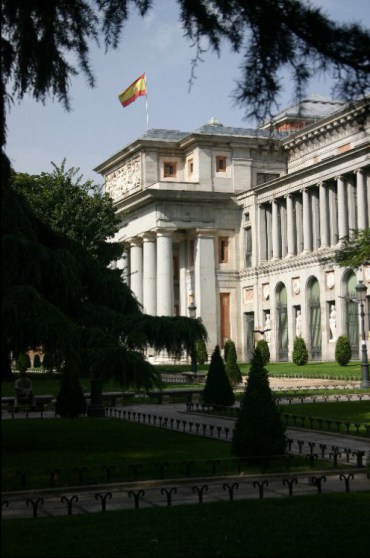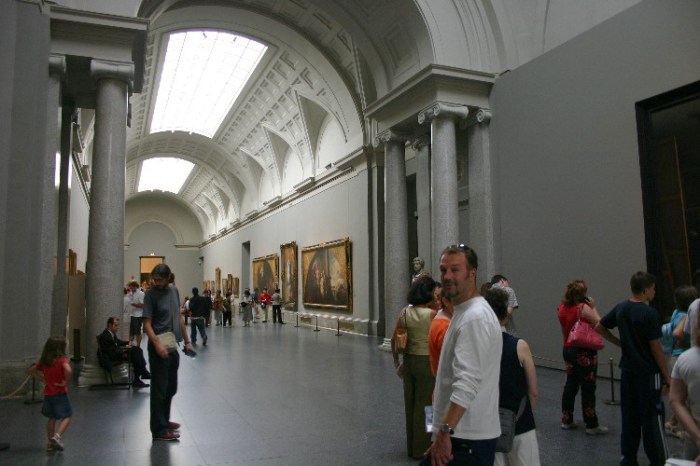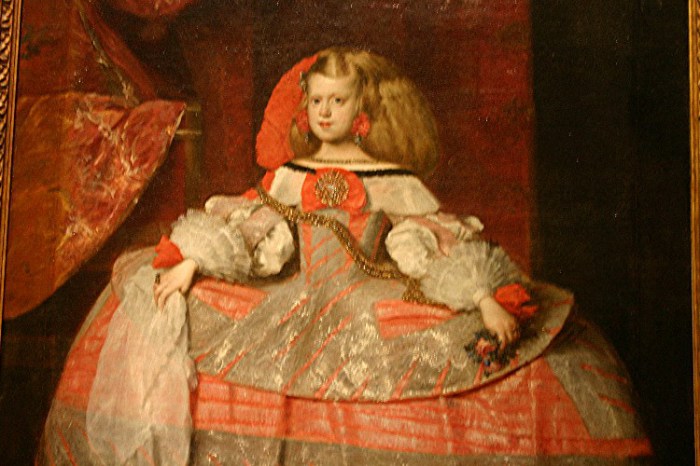I was merciless yesterday
as we did our walking tour of Madrid: although the guidebook told us that the walking tour would take at least two days, we got it done in one (and were our feet complaining loudly last night? You bet they were!). The reason (don’t tell Greg): this way we get to spend the entire day today in the Prado Museum or as the locals call it, the Museo del Prado
Conveniently, Madrid’s commuter trains all head to Atocha, the main train station that is a stone’s throw away from the Prado, and so we take the train in this morning. We realize after we pull out of the station that it was these suburban trains that were bombed March of 2004, a bombing that in all probability changed the outcome of the Spanish general election. All of a sudden, we realize that there we have seen signs everywhere in Spain that say “no war.” The Museo del Prado Entradas has three of them and we can breeze right in, no line-ups for the walk through the metal detectors and x-ray machines; too bad airports aren’t this fast!
Spain at its Zenith
The Museo del Prado collection is focused on art collected when Spain’s power was at its zenith. We have entered at the south end, so we work our way through the ground floor collection of art from 1100 to 1600. All amazing, we are particularly fascinated by the El Grecos and the Hieronymus Bosch’s, especially his masterpiece The Garden of Earthly Delights. (Greg tells me that we need to focus our attention because we will not be able to see every room. I nod sweetly, thinking to myself that I am going to see every room if it kills me.)
Up we go to the 1st floor, the more modern art collected from 1600 to 1800. Amazed as we were by the breadth of the El Greco collection, the Velazquez, and Goya collections are stunning. We are totally immersed into the painting of Las Meninas (or La Familia de Felipe IV), the story as clearly told as is possible, and we wonder how Velazquez could predict the future so clearly, that this little Infanta would have such a significant role in history, far greater than her parents. (To read about the picture and see it more clearly than below, go to Las Meninas.)
And So Much More
We still haven’t mentioned the Rubens, many painted with the assistance of the young Van Dyck. Or the Goyas, more even than there are by Velazquez. We cannot imagine another artist, except possibly Picasso, than Goya, whose style varies so dramatically, from his formal court portraits, through his designs for the royal tapestries, to his Black Paintings, so dark and modern, painted for his own eyes only, many done as murals for his home. Barely able to stand, we climb the stairs to the 2nd floor, thankfully only a small portion of which is open to the public. It is mainly full of Goya’s tapestry designs, called “cartoons” but beautiful oil canvases, full of life and, perhaps because they were never intended for public display, full of joie de vivre.
It is almost six hours later when we leave the Prado, and we haven’t sat for more than a minute or two. We walk to the nearest Metro, take the train to Chueca, buy Greg a new pair of walking shoes (his first new pair since we started our adventure last January) which we name his Prados, and join the locals for a beer in the Plaza, standing, nowhere to sit. We don’t stay long.
We take the metro home and barely make the 10-minute walk back to our hotel before we collapse. They serve us food and liquid, and we revive enough to make it to the room.






Comments